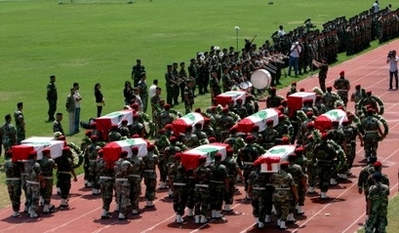 TRIPOLI, Lebanon (AFP) - The Lebanese army on Thursday held an emotional ceremony for nine soldiers who were among 14 people killed in a bomb attack the previous day that targeted the military in northern Lebanon. But even as the ceremony was underway in the tense northern city of Tripoli a man was shot and wounded near flashpoint neighbourhoods where 23 people were killed in sectarian fighting in June and July, a police official said. Thunderous applause broke out as nine coffins draped in Lebanese flags were carried shoulder high by comrades of the dead soldiers into a sports stadium in the port city. Another group of soldiers carrying wreath composed of white, red and green flowers -- the colours of the Lebanese flag -- preceded the pall-bearers into the stadium.Interior Minister Ziad Baroud and acting army chief Shawki al-Masri attended the ceremony alongside relatives and friends of the soldiers, who wept as the coffins were brought into the stadium to a full military salute. The soldiers aged between 21 and 32 were killed when a bomb hidden in a bag exploded near a bus stop during morning rush hour on Wednesday. A shoeshine boy was among the five other civilians killed in the attack. The attack was the deadliest in the troubled country in three years and came only hours before President Michel Sleiman, the former army chief, was due to begin a visit to neighbouring Syria to launch first ever diplomatic ties. President Suleiman held a meeting with security officials in the presence of Defense, Interior and Finance minister to direct the investigation. Forty people were also injured in the attack. Masri denounced what he called "cowardly terrorism which targets the Lebanese army" and said that the attack "will not deter the army from its duty to defend the nation." Shawki has been at the helm of the army since Sleiman was elected president on May 25, after rival politicians reached a power-sharing agreement in the Qatari capital of Doha to end 18 months of political crisis. Prime Minister Fuad Siniora, whose recently-formed cabinet was confirmed by parliament just a day before the attack, called for three days of mourning across Lebanon from Thursday. Siniora had also called for a one-hour work-stoppage across the country at midday Thursday. The call was heeded throughout Tripoli where residents also observed five minutes of silence at the request of the prime minister, while black flags decked Lebanon's second city in sign of mourning. Funerals for the soldiers will be held privately.
TRIPOLI, Lebanon (AFP) - The Lebanese army on Thursday held an emotional ceremony for nine soldiers who were among 14 people killed in a bomb attack the previous day that targeted the military in northern Lebanon. But even as the ceremony was underway in the tense northern city of Tripoli a man was shot and wounded near flashpoint neighbourhoods where 23 people were killed in sectarian fighting in June and July, a police official said. Thunderous applause broke out as nine coffins draped in Lebanese flags were carried shoulder high by comrades of the dead soldiers into a sports stadium in the port city. Another group of soldiers carrying wreath composed of white, red and green flowers -- the colours of the Lebanese flag -- preceded the pall-bearers into the stadium.Interior Minister Ziad Baroud and acting army chief Shawki al-Masri attended the ceremony alongside relatives and friends of the soldiers, who wept as the coffins were brought into the stadium to a full military salute. The soldiers aged between 21 and 32 were killed when a bomb hidden in a bag exploded near a bus stop during morning rush hour on Wednesday. A shoeshine boy was among the five other civilians killed in the attack. The attack was the deadliest in the troubled country in three years and came only hours before President Michel Sleiman, the former army chief, was due to begin a visit to neighbouring Syria to launch first ever diplomatic ties. President Suleiman held a meeting with security officials in the presence of Defense, Interior and Finance minister to direct the investigation. Forty people were also injured in the attack. Masri denounced what he called "cowardly terrorism which targets the Lebanese army" and said that the attack "will not deter the army from its duty to defend the nation." Shawki has been at the helm of the army since Sleiman was elected president on May 25, after rival politicians reached a power-sharing agreement in the Qatari capital of Doha to end 18 months of political crisis. Prime Minister Fuad Siniora, whose recently-formed cabinet was confirmed by parliament just a day before the attack, called for three days of mourning across Lebanon from Thursday. Siniora had also called for a one-hour work-stoppage across the country at midday Thursday. The call was heeded throughout Tripoli where residents also observed five minutes of silence at the request of the prime minister, while black flags decked Lebanon's second city in sign of mourning. Funerals for the soldiers will be held privately.
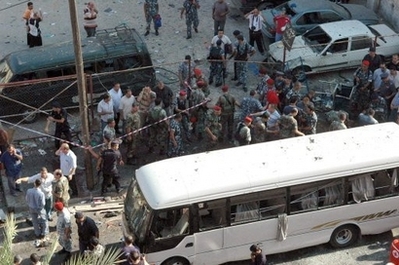 By Nazih Siddiq , TRIPOLI, Lebanon (Reuters) - A bomb killed at least 14 people, including nine soldiers, at a bus stop in the northern Lebanese city of Tripoli on Wednesday, security sources said. The bomb, which also wounded at least 45 people, was the deadliest attack on the army since its battle with al Qaeda-inspired Islamist militants in the north last year. It had been placed in a bag at the bus stop where soldiers usually gather, the army said in a statement, describing the attack as a "terrorist bombing" -- a phrase used in the past by the military when it suspects militant Islamist involvement. The army put the initial death toll at 11 but other medical and security sources said it had risen as casualties died from their wounds. The blast struck at 7.45 a.m. (5:45 a.m. British time) as people made their way to work. Red Cross workers ferried casualties to hospital. The ground was spattered with blood and covered in shards of glass, television pictures showed. There were no immediate claims of responsibility for the attack in Lebanon's second largest city, which has been the scene of fighting between security forces and Islamist militants and sectarian violence linked to political tension in Lebanon. "The army and security forces will not yield to attempts to terrorise them with attacks and crimes," said President Michel Suleiman, who had been army chief until his election in May.
By Nazih Siddiq , TRIPOLI, Lebanon (Reuters) - A bomb killed at least 14 people, including nine soldiers, at a bus stop in the northern Lebanese city of Tripoli on Wednesday, security sources said. The bomb, which also wounded at least 45 people, was the deadliest attack on the army since its battle with al Qaeda-inspired Islamist militants in the north last year. It had been placed in a bag at the bus stop where soldiers usually gather, the army said in a statement, describing the attack as a "terrorist bombing" -- a phrase used in the past by the military when it suspects militant Islamist involvement. The army put the initial death toll at 11 but other medical and security sources said it had risen as casualties died from their wounds. The blast struck at 7.45 a.m. (5:45 a.m. British time) as people made their way to work. Red Cross workers ferried casualties to hospital. The ground was spattered with blood and covered in shards of glass, television pictures showed. There were no immediate claims of responsibility for the attack in Lebanon's second largest city, which has been the scene of fighting between security forces and Islamist militants and sectarian violence linked to political tension in Lebanon. "The army and security forces will not yield to attempts to terrorise them with attacks and crimes," said President Michel Suleiman, who had been army chief until his election in May.
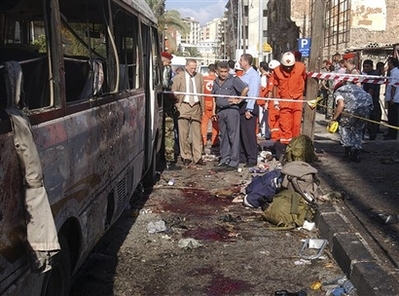 (AFP) by Omar Ibrahim, A child who was polishing shoes on the street was among the 14 dead, the official said, adding that nine of those killed and many of the wounded were soldiers. "My son! My son!," screamed one mother striking her chest at a Tripoli hospital after learning that her 22-year-old soldier son was dead. It was the deadliest attack on the army since a 15-week battle last year the Al-Qaeda inspired Fatah al-Islam militia in an impoverished Palestinian refugee camp near Tripoli that left 400 people dead, including 168 soldiers. The army said the bomb was planted in a bag at a military gathering point in the Masarif Street commercial district of Tripoli and exploded near a public bus carrying soldiers from the northern region of Akkar. "The terrorist explosion directly targets the army and peaceful co-existence in the country," it said in a statement. The attack also came just a day after a national unity government formed by Prime Minister Fuad Siniora following 18 months of deadly tensions with the Hezbollah-led opposition finally won a vote of confidence in parliament. The crisis had pushed the country to the brink of a new civil war and was only ended by an Arab-brokered power-sharing agreement in May.
(AFP) by Omar Ibrahim, A child who was polishing shoes on the street was among the 14 dead, the official said, adding that nine of those killed and many of the wounded were soldiers. "My son! My son!," screamed one mother striking her chest at a Tripoli hospital after learning that her 22-year-old soldier son was dead. It was the deadliest attack on the army since a 15-week battle last year the Al-Qaeda inspired Fatah al-Islam militia in an impoverished Palestinian refugee camp near Tripoli that left 400 people dead, including 168 soldiers. The army said the bomb was planted in a bag at a military gathering point in the Masarif Street commercial district of Tripoli and exploded near a public bus carrying soldiers from the northern region of Akkar. "The terrorist explosion directly targets the army and peaceful co-existence in the country," it said in a statement. The attack also came just a day after a national unity government formed by Prime Minister Fuad Siniora following 18 months of deadly tensions with the Hezbollah-led opposition finally won a vote of confidence in parliament. The crisis had pushed the country to the brink of a new civil war and was only ended by an Arab-brokered power-sharing agreement in May.
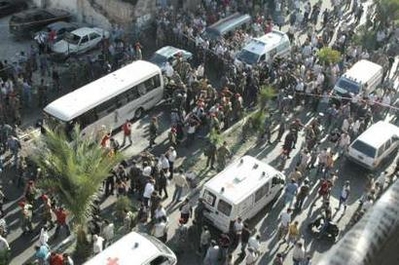 Sleiman, who was army chief until his election as president by MPs in May, condemned what he called a "terrorist crime," a sentiment echoed by Syria. "The army and security forces will not be terrorised by attacks and crimes that target it and civil society, and the history of the army attests to that," Sleiman said in a statement. The security official said the bomb was packed with 20 kilogrammes (44 pounds) of explosives, and the force of the blast blew the remains of some of the dead on to the roofs of nearby buildings. The Mediterranean port city has been rocked by deadly violence between anti-Syrian supporters Siniora and his Damascus-backed rivals amid a long-running political crisis. In Tripoli, desperate families gathered at four hospitals to check on the fate of their loved ones but were blocked by security from entering. One hospital official said identification was delayed because some bodies were mutilated beyond recognition. "The hands of the criminals have hit in Tripoli," said Information Minister Tareq Mitri. "The investigation has begun and there are many interpretations, political interpretations."
Sleiman, who was army chief until his election as president by MPs in May, condemned what he called a "terrorist crime," a sentiment echoed by Syria. "The army and security forces will not be terrorised by attacks and crimes that target it and civil society, and the history of the army attests to that," Sleiman said in a statement. The security official said the bomb was packed with 20 kilogrammes (44 pounds) of explosives, and the force of the blast blew the remains of some of the dead on to the roofs of nearby buildings. The Mediterranean port city has been rocked by deadly violence between anti-Syrian supporters Siniora and his Damascus-backed rivals amid a long-running political crisis. In Tripoli, desperate families gathered at four hospitals to check on the fate of their loved ones but were blocked by security from entering. One hospital official said identification was delayed because some bodies were mutilated beyond recognition. "The hands of the criminals have hit in Tripoli," said Information Minister Tareq Mitri. "The investigation has begun and there are many interpretations, political interpretations."
كلمة النائب الدكتور فريد الياس الخازن
في جلسة مناقشة البيان الوزاري (حكومة الرئيس السنيورة الثانية)
11/8/2008
انه بيان حكومة في دولة كأنها في طور التأسيس. لا عجب في ذلك بعد المخاض العسير الذي سبق ورافق تشكيل حكومة جامعة انتظرنا ولادَتها قبل ثلاث سنوات, والتي نطمح ان تكون فعلا حكومة الارادة الوطنية الجامعة.
الى اليوم, وللاسف, لم تكن الارادة الوطنية جامعة سوى في الازمات والانقسامات. الازمة السياسية البالغة التعقيد التي مرت بها البلاد انتجت تسوية سياسية تبلورت في اتفاق الدوحه, وهو الاتفاق اللبناني
المسيحيون بين حقوقهم ودورهم وصلاحياتهم
جريدة النهار في 07 آب 2008
بقلم سجعان قزي
يمزج المسيحيون اللبنانيون، لاسيما الموارنة منهم، بين حقوقهم ودورهم وصلاحياتهم. حقوق المسيحيين هي نفسها التي يتمتع بها أي مواطن لبناني. ولأنها كذلك يحفظها الدستور والقانون، ولو أصبح عددهم واحداً فقط (قاعدة المساواة). غير أن دور المسيحيين هو المميز. ولأنه كذلك فلا يضمنه سواهم، ولو اعترف به ألف ميثاق وألف عُرف؛ وضمانته سلوك مسيحي خلاّق وطنياً وحضارياً وأخلاقياً (قاعدة الاستحقاق). أما صلاحياتهم فهي مُحَـصِّلة دستورية لمجموعة عناصر تاريخية ومشرقية وغربية، ولمجموعة موازين سياسية وعسكرية وديمغرافية. ولأنها كذلك فهي عرضة للتقييم حسب تطور مجموعة هذه العناصر والموازين، ولكن مهما تعدّلت هذه الصلاحيات، لا يجوز أن تمس دور المسيحيين السياسي والوطني، أو حقوقهم الإنسانية والطائفية في لبنان (قاعدة التعددية الحضارية).
مسؤولية ضعف الدور المسيحي
لذلك، حريّ بالمسيحيين أن يَشْكوا من ضعف دورهم لا من افتئات حقوقهم، ومن تساهل عدد من قادتهم لا من تقليص صلاحياتهم. فحقوق كل المواطنين مهضومة بحكم تقصير الدولة وعجزها البنيوي والمادي. وصلاحيات كل الطوائف معطلة مع تغييب الدولة، أو تُمارس خارج الشرعية.
كانت الدولة اللبنانية تشبه سيارة يقودها ماروني بصلاحيات تسمح له التحكّم بالمِقْـوَد وعُلبة السرعة والفرامل. جاء دستور الطائف فأبقى المِقْـوَد بيد الماروني، وانتزع منه السنّي علبة السرعة والشيعيّ الفرامل، فتوقفت السيارة لأن كل طرف استعمل الجزء الذي استولى عليه باتجاه معاكس للجزأين الآخرَين. واليوم الدولة اللبنانية في المرآب، وغداً قد تُباع قِطعَ غِيارٍ مستعملة لدويلات ناشئة (مشهد مبكٍ)، لكن الماروني والسني والشيعي سيحتفظون بالمقود وعلبة السرعة والفرامل من دون سيارة (مشهد مضحك).
Residents in Tripoli, where Hariri has wide influence, say they are paying the price through a conflict between an Alawite faction linked to Hezbollah and an array of Sunni groups. "This struggle calms down for a while, then it opens up again," said Bilal Matar, a Sunni figure from Bab Tibbaneh. "The open wound is still there." MUTUAL FEAR - The latest round of fighting, which lasted for two days, ended when the army deployed to stop battles between Alawite gunmen who belong to a pro-Syrian party and Sunni fighters. All Sunni leaders, even those allied to Syria, have been forced to take sides or risk losing popularity among Sunni constituents ahead of elections next year, explained Matar. "It's these cheap electoral calculations," he said. In Bab Tibbaneh, fear has spread of sectarian massacres, said Matar. Alawites in Jabal Mohsen are concerned, especially by the appearance of gunmen in the garb of Islamist militants. The Alawite faith, an offshoot of Islam, is regarded as heretical by Muslim hardliners. Its followers in Tripoli say they fear for their very survival.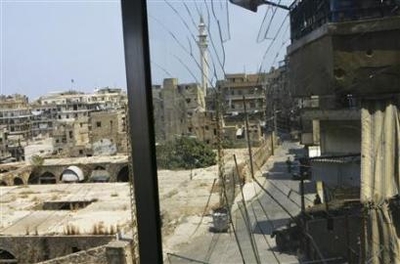 By Tom Perry , TRIPOLI (Reuters) - In Tripoli's most deprived areas, Lebanon's lingering political troubles are being fought out in a sectarian conflict that threatens to cause more bloodshed.Scorched building facades indicate the frontlines of heavy battles between gunmen in the Sunni Muslim Bab Tibbaneh district and fighters in Jabal Mohsen -- a neighboring hill which is home to Tripoli's Alawite minority."After the battles, there is blood on the ground. Things will get worse," said Mohammed al-Saloum, one of hundreds of Bab Tibbaneh residents forced from their homes by fighting which has killed 22 people in the past two months. "There is fear."The battles have underlined the risk of more volatility in Lebanon, which was pulled from the jaws of a new civil war in May by a Qatari-brokered deal. The country's rival alliances are far from full reconciliation.
By Tom Perry , TRIPOLI (Reuters) - In Tripoli's most deprived areas, Lebanon's lingering political troubles are being fought out in a sectarian conflict that threatens to cause more bloodshed.Scorched building facades indicate the frontlines of heavy battles between gunmen in the Sunni Muslim Bab Tibbaneh district and fighters in Jabal Mohsen -- a neighboring hill which is home to Tripoli's Alawite minority."After the battles, there is blood on the ground. Things will get worse," said Mohammed al-Saloum, one of hundreds of Bab Tibbaneh residents forced from their homes by fighting which has killed 22 people in the past two months. "There is fear."The battles have underlined the risk of more volatility in Lebanon, which was pulled from the jaws of a new civil war in May by a Qatari-brokered deal. The country's rival alliances are far from full reconciliation.
Khazen History


Historical Feature:
Churches and Monasteries of the Khazen family

St. Anthony of Padua Church in Ballouneh
Mar Abda Church in Bakaatit Kanaan
Saint Michael Church in Bkaatouta
Saint Therese Church in Qolayaat
Saint Simeon Stylites (مار سمعان العامودي) Church In Ajaltoun
Virgin Mary Church (سيدة المعونات) in Sheilé
Assumption of Mary Church in Ballouneh
1 - The sword of the Maronite Prince
2 - LES KHAZEN CONSULS DE FRANCE
3 - LES MARONITES & LES KHAZEN
4 - LES MAAN & LES KHAZEN
5 - ORIGINE DE LA FAMILLE
Population Movements to Keserwan - The Khazens and The Maans
ما جاء عن الثورة في المقاطعة الكسروانية
ثورة أهالي كسروان على المشايخ الخوازنة وأسبابها
Origins of the "Prince of Maronite" Title
Growing diversity: the Khazin sheiks and the clergy in the first decades of the 18th century
Historical Members:
Barbar Beik El Khazen [English]
Patriach Toubia Kaiss El Khazen(Biography & Life Part1 Part2) (Arabic)
Patriach Youssef Dargham El Khazen (Cont'd)
Cheikh Bishara Jafal El Khazen
Patriarch Youssef Raji El Khazen
The Martyrs Cheikh Philippe & Cheikh Farid El Khazen
Cheikh Nawfal El Khazen (Consul De France)
Cheikh Hossun El Khazen (Consul De France)
Cheikh Abou-Nawfal El Khazen (Consul De France)
Cheikh Francis Abee Nader & his son Yousef
Cheikh Abou-Kanso El Khazen (Consul De France)
Cheikh Abou Nader El Khazen
Cheikh Chafic El Khazen
Cheikh Keserwan El Khazen
Cheikh Serhal El Khazen [English]
Cheikh Rafiq El Khazen [English]
Cheikh Hanna El Khazen
Cheikha Arzi El Khazen
Marie El Khazen